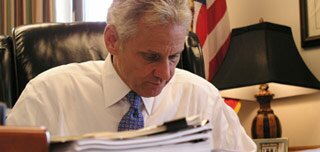Medicaid Fraud
Medicaid Fraud is Big Business for Criminals
How big?
The FBI conservatively estimates that 10 cents of each dollar spent on Medicaid each year is lost to fraud and abuse. In fiscal year 1994, the U.S. spent $107 billion on Medicaid, so that means more than $10 billion was lost to fraud and deceit.
South Carolina spends about $2.7 billion each year on Medicaid, combining state and federal funds. So using the federal equation, the Palmetto State loses about $270 million to fraud each year.
Why?
Medicaid is uniquely vulnerable to fraud because of the huge sums of money and large number of providers involved. Also, it appears that organized crime is engaging in health care fraud because it has a higher payback and lower chance of detection than other criminal activity. And Medicaid fraud cases have rarely been prosecuted by state or federal authorities.
The Solution
But that's no longer the case in South Carolina, where the Attorney General's office has established the state's first certified Medicaid Fraud Control Unit. Using federal funds, the unit is investigating and prosecuting fraud and patient abuse throughout the state.
In 1994, the General Assembly passed South Carolina's first Medicaid false-claim statute. The law makes it illegal to file false claims or otherwise defraud Medicaid funds managed by the state. The act allows the state to seek criminal penalties, including jail terms and civil fines, for those found guilty of fraud or patient abuse in Medicaid-funded facilities.
The unit focuses on two kinds of crimes: provider fraud and patient abuse.
Examples of Provider Fraud
- Billing for nonexistent or unnecessary medical services
- Billing for more expensive products or services than were provided
- Paying kickbacks to patients or other providers for patient referrals
- Inflating a nursing home's annual cost report
- Padding mileage accumulated on ambulance trips
- Billing for professional services rendered by personnel lacking appropriate credentials
Patient Abuse
Patient abuse encompasses physical abuse or neglect, as well as financial crimes such as breach of trust or theft of a patient's money. It's not necessary that the abused patient receive Medicaid, only that the facility where the patient is located receives Medicaid money, no matter how small the amount.
Medicaid fraud investigations are not easy to conduct. The Fraud Unit must interview witnesses and examine financial records, claim forms, medical records and other documents. The unit works closely with other state agencies to investigate claims of provider fraud.
What to do
The unit also welcomes tips from private citizens, such as employees or associates who work with providers who cheat the Medicaid system. The majority of reports of patient abuse come from family members or workers in hospitals and nursing homes.
Report it
If you have any information about Medicaid provider fraud or patient abuse, please report it to Attorney General McMaster's Medicaid Fraud Unit at: (803) 734-3660 or call toll-free: 1-888-NO CHEAT (1-888-662-4328)
Tips can be made anonymously.
